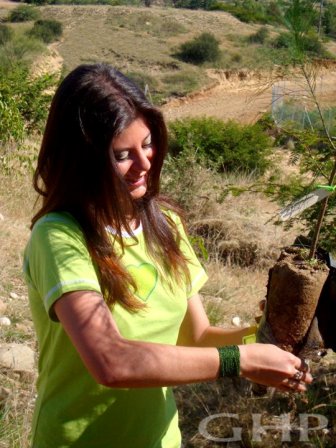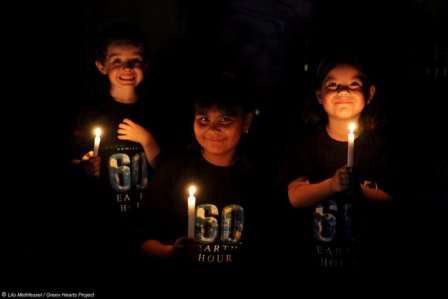|
What is the Greenhearts Project?
 
GREENHEARTS PROJECT is a voluntary social movement involving friends who share a feeling and vision for "a Bolivia that serves as an Environmental Refuge for us, future generations, and all of humanity". GREENHEARTS PROJECT, exists because this fragile Earth deserves a voice. It needs solutions. It needs change. It needs action.
Our objective is to generate sufficient commitment through interconnection and the active participation of allies from which to gather strength and support for the global challenges we will face together in the future. Our mission is to build upon responsibility and love for life and each other, the latter being both human beings and all other forms of life, with the understanding that we were put at the forefront of creation. We believe new generations can fulfill a transcendental role in view of the threat of global extinction. GHP works with matters involving universal law and responsibility. The environment is a heritage that belongs to everyone. The organization carries out its activities through the FILBO Foundation's Environmental Development Component under the framework of the Development Goals of the
Millennium Project.
What you should know about BoliviaGHP actions are based out of Bolivia, in the heart of South America. The following are some facts about Bolivia you might not know:
•The highest navigable lake in the world is located in Bolivia at 3.810 masl. Lake Titicaca is drying up and may soon split into three lakes. Green Hearts Project Highlights
On 4 December 2009, in the city of Santa Cruz, Bolivia, Greenhearts Project signed a first Ecological Alliance within the framework of its "Green Bolivia Blue Planet" program, in response to our vision of building towards a Bolivia that acts as an Environmental Refuge for Mankind. We work under the premise of "Acting Locally and Thinking Globally." The alliance establishes the creation of a 200,000 hectare reserve in the community of El Carmen in the Department of Beni, destined to conservation and the mitigation of greenhouse gases. Under the idealist and pragmatic principle that faith without works is not faith, we visualize a Green Bolivia that conserves biodiversity with no regard for geographical limits. Upon this premise we conceived our Green Bolivia Blue Planet program for a healthy planet. It's a solid idea, taking concrete actions to make this a reality takes much effort. Shortly after the Industrial Revolution and prior to the foundation of the United Nations Organization, there were already warnings that the social policies regarding exaggerated industrial development in view of a limited amount of resources would be administratively unsustainable. Over time several international and national organizations were created in the defense of human rights, resources and ecosystems. Trillions of dollars have been invested in this the world over. However, the environmental degradation of our planet continues to advance in geometric proportions. Today experts warn that the saturation levels of greenhouse gases have surpassed projected levels and if this trend continues at the current rate, we will reach critical levels in under 50 years. This phenomenon has surpassed the capacities of the traditional governmental and non-governmental institutions to take action and to react. After the COP15 Conference in Conpenhaguen (during which we expected world leaders to assume responsibility on our universal rights and obligations regarding the environment) we see that we must continue to wait for this to happen. And while we wait the planet continues to be degraded and thousands of forests and plant and animal species, continue to become extinct each day while communities become poorer and less sustainable. This has caused individuals and civilian groups to commit to "Individual Responsibility". Greenhearts Project has thus committed to "acting locally and thinking globally." Our members contribute to both tangible and intangible goals. As a result, during our first year (2009) we prioritized our work in the river basin regions of the Bolivian Chaco and Amazon and are working on the following: 1) We are in the process of forming a network of forest reserves in three categories, each with a different objective: a. The first is located in the valley of Concepción in the Municipality of Uriondo in the Department of Tarija with a surface area of 5000 hectares. It will be used to recover degraded soils, aquifers, mitigate greenhouse gases through a reforestation program involving the planting of 2 million trees. b. The second, and our main focus at this time, is located in the community of El Carmen in the Department of Beni. It is 200,000 hectares in size and will be destined to conservation and the mitigation of greenhouse gases. c. The third is located in Irupana in the Department of La Paz. It covers 30 hectares of surface and will be used to educate on sustainable development, and for research.
2) Develop environmental education programs directed at school-aged children and teens to develop ecological awareness and form future leaders. This is being done through an agreement with the Centro Boliviano Americano and other schools and institutes.
3) We are working to promote the passing of a regulation in the municipality of Cercado in the Department of Tarija that will regulate and limit the use of plastic bags. 4) GHP and BoliviaBella.com are now working together to spread the word on our strategy for forest reserves and other activities. In addition, BoliviaBella.com hosts the GHP webpage. 5) In 2009 we formed a fraternal alliance with WWF Bolivia to promote Earth Hour each year in Tarija, Bolivia.
Although our contributions may seem small, we hope to expand our network of reserves and begin implementing them. We will continue to advance toward our mission along with GHP friends and partners working together to grow this green heart. |

